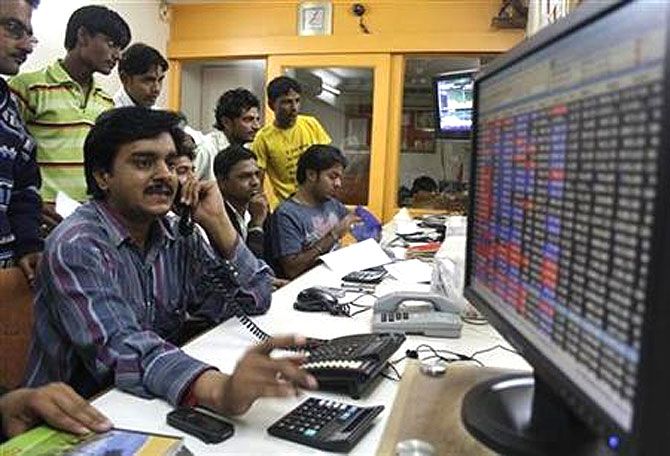In the 21st century, foreign investors invested $160 billion (in today's dollars) in India's equity markets.
 The US Federal Reserve has started to wean the US economy off phantom money, euphemistically called "quantitative easing" (QE).
The US Federal Reserve has started to wean the US economy off phantom money, euphemistically called "quantitative easing" (QE).
Reserve Bank of India (RBI) Governor Raghuram Rajan has been apprehensive about its potential impact on emerging economies like India.
He made a vocal plea for a globally co-ordinated monetary policy action, ostensibly after due consideration of the impact of global capital flows on emerging economies.
The then fellow at Peterson Institute Arvind Subramanian together with PrincetonUniversity economist Dani Rodrik, through an article in this paper ("Emerging Markets' Victimhood Narrative," February 1, 2014) pointed to the disingenuity of such claims of victimhood.
They argued how emerging markets "consciously and enthusiastically embraced financial globalisation" to soak up foreign capital flows during times of easy money and contended that emerging markets are "simply reaping what they have sown".
Over the next few weeks and months, as the tide of US capital flows run out, naked swimmers in emerging economies could be exposed, (the tangible impact of Bank of Japan's renewed benevolence in flooding the market with liquidity is still unclear).
Amid such bay watching, this is yet another opportunity for policymakers in emerging economies to assess reliance and susceptibility of various sectors in their economy to foreign flows.
In this context, the badge of honour for dependence on foreign capital flows in the Indian economy can be bestowed on our equity markets.
Analysis of all factors such as gross domestic product (GDP) growth, interest rates, domestic institutional investor (DII) flows, foreign institutional investor flows (FII), corporate earnings and so on that typically move stock markets, reveals that FII flows alone explain movement in the BSE Sensex since 2000.
In the 21st century, foreign investors invested $160 billion (in today's dollars) in India's equity markets.
In the same period, GDP grew from $430 billion to $1.2 trillion, the BSE Sensex rose from 5,000 to 26,000, market capitalisation of the stock market went from $166 billion to $1.7 trillion while domestic Indian mutual fund investors withdrew (yes, not invested) $6 billion from the equity markets.
This seemingly spectacular climb in equity values in the last two decades has been fuelled almost entirely by foreign investors.
A simple multivariate regression analysis of quarterly market movements over the last 55 quarters (since Q1 2000) and independent variables reveals that FII flows singularly explain such market moves.
More striking is the negative correlation between foreign investor flows and domestic investor flows in the same period. Further, it is not abundantly evident from our analysis that foreign flows into India merely chased India's higher than global GDP growth and that home country factors perhaps played a larger role in these flows finding its way into Indian equities.
It's clear that behind the five-fold increase in Sensex and ten-fold increase in market capitalisation in the 21st century is actually the greenback, not the signature of our RBI governor.
Amid the recent brouhaha over whether it was right for our national stock exchanges to be closed for Maharashtra elections while being open for trading on Diwali day, it may be wiser to shut our exchanges on the American Independence Day of July 4 and Chinese Lunar New Year instead.
To be sure, this is not some stunning new revelation that our equity markets are beholden to foreign flows.
There have been repeated attempts in the past to lure a small percentage of the $100-billion corpus of Employees' Provident Fund or to better channel the 35 per cent household savings into productive equity markets.
They have failed for the same reason - inherent fear and distrust of the equity markets by most Indians and dependence on volatile foreign flows only exacerbates this distrust.
Restoring faith in our markets will require a fix of the root causes of this distrust - market volatility and uncertainty, speculative characteristic of our markets, laxity of regulation and dubious behaviour of market participants.
Subramanian and Rodrik were right in their prognosis that when it comes to vulnerability to global capital flows, emerging economies will only reap what they sow.
Subramanian, in his new avatar as the Chief Economic Advisor of India, now has both the opportunity and profound research expertise in economic institutions, to help re-sow our capital markets differently.
(Praveen Chakravarty is a former CEO of an investment bank, corporate advisor and founding trustee of IndiaSpend. With help from Vijay Sarathi, ex-Executive Director of Nomura Securities and visiting faculty, IIM-Indore)












 © 2025
© 2025